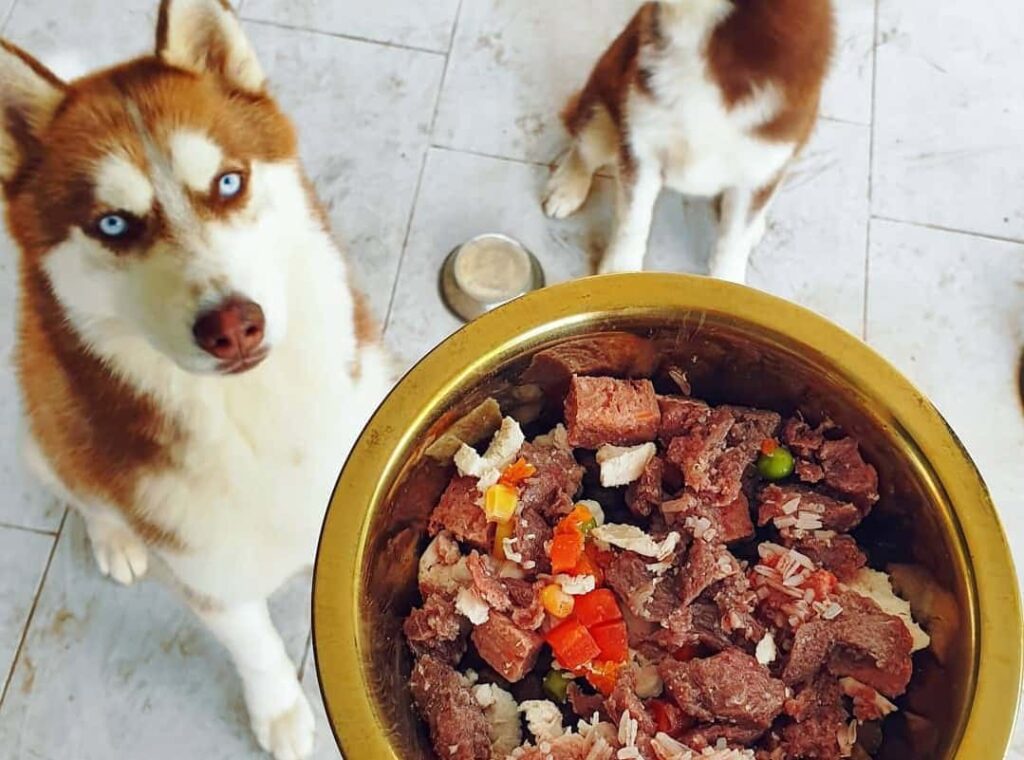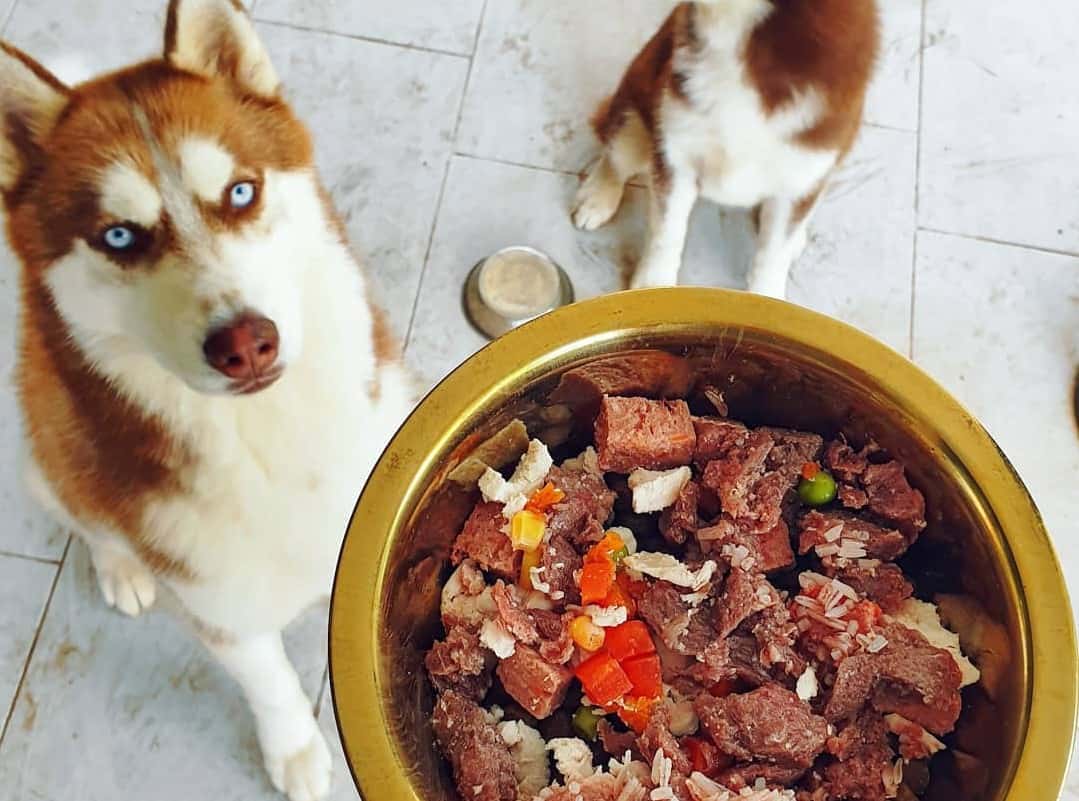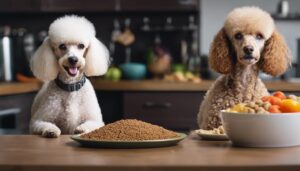Huskies are a unique and energetic breed, known for their striking appearance, boundless energy, and hardworking nature. Whether they’re pulling sleds in the Arctic or lounging in your living room, providing the best Husky food is essential to maintaining their health and vitality. In this comprehensive guide, we’ll explore the best food options for Huskies, catering to their specific dietary needs and preferences.

Understanding a Husky’s Nutritional Needs
1. High-Quality Protein
Protein is vital for muscle maintenance and repair. Choose dog food that contains high-quality protein sources such as chicken, beef, lamb, fish, or turkey.
2. Healthy Fats
Huskies require healthy fats for energy and a glossy coat, particularly omega-3 and omega-6 fatty acids from sources like fish oil, flaxseed, and chicken fat.
3. Complex Carbohydrates
Carbohydrates offer lasting energy, with sweet potatoes, brown rice, and oats serving as excellent sources. These complex carbohydrates are not only packed with energy but also provide essential nutrients and fiber, promoting digestive health. Incorporating these foods into your diet can help stabilize blood sugar levels, leaving you feeling fuller for longer.
4. Vitamins and Minerals
Vitamins A, D, E, and zinc are important nutrients that promote overall health, including boosting immunity and improving skin and coat quality. These essential nutrients work synergistically to support various bodily functions. Vitamin A is crucial for maintaining healthy vision and skin integrity, while vitamin D plays a vital role in calcium absorption and bone health.
5. Caloric Intake
Huskies have efficient metabolisms and do not tend to overeat, so it is important to give them food that is nutrient-dense and properly portioned
Best Husky Food: A Complete Guide to Optimal Nutrition for Your Siberian Companion
Huskies are a unique and energetic breed, known for their striking appearance, boundless energy, and hardworking nature. Whether they’re pulling sleds in the Arctic or lounging in your living room, Huskies require a balanced and nutritious diet to maintain their health and vitality. In this comprehensive guide, we’ll explore the best food options for Huskies, catering to their specific dietary needs and preferences.
Understanding a Husky’s Nutritional Needs
Huskies are medium-sized working dogs with specific dietary requirements. Their origin as sled dogs in cold climates means they have adapted to a high-energy diet that supports their active lifestyle. Key aspects of their nutrition include:
1. High-Quality Protein
Protein is essential for muscle maintenance and repair. Aim for dog food with high-quality protein sources like chicken, beef, lamb, fish, or turkey
2. Healthy Fats
Huskies need healthy fats for energy and a shiny coat. Look for omega-3 and omega-6 fatty acids, commonly found in fish oil, flaxseed, and chicken fat.
3. Complex Carbohydrates
Carbohydrates provide sustained energy. Sweet potatoes, brown rice, and oats are excellent sources.
4. Vitamins and Minerals
Essential nutrients like vitamins A, D, E, and zinc contribute to overall health, from immunity to skin and coat quality.
5. Caloric Intake
Huskies have efficient metabolisms and don’t overeat. Feeding them nutrient-dense food in appropriate portions is key.

Types of Dog Food for Huskies
1. Dry Kibble
Dry kibble is a preferred choice for many dog owners because it is easy to store and has a long shelf life. When choosing kibble for your Husky, opt for high-quality, grain-free brands that list a specific type of meat as the first ingredient. Stay away from brands that include fillers, artificial preservatives, or by-products.
2. Wet Food
Wet food’s higher moisture content provides extra hydration for Huskies. It is generally more palatable but less calorie-dense than kibble. This can be particularly beneficial for active Huskies, who often require optimal hydration to maintain their energy levels during vigorous play or exercise. Additionally, the softer texture of wet food can be easier on their dental health, especially for older dogs or those with sensitive teeth.
3. Raw Diet
The raw food diet, known as BARF (Biologically Appropriate Raw Food), mimics a Huskie’s natural diet, which includes raw meat, bones, and vegetables. While this diet provides excellent nutrition, it requires careful preparation to ensure the meals are balanced.
4. Homemade Food
Homemade diets give you the ability to manage your Husky’s nutrition. Include cooked meats, vegetables, and grains to ensure balanced meals. It’s a good idea to consult a veterinarian or a dog nutrition expert to avoid nutritional deficiencies.
5. Freeze-Dried and Dehydrated Food
Freeze-dried and dehydrated foods provide essential raw nutrition in an easily accessible and lightweight dry format—just add water to rehydrate them back to their original state. This simple process allows you to quickly enjoy wholesome meals and snacks without the need for extensive preparation or cooking, making them an excellent choice for those who value convenience.
Common Ingredients to Avoid
Not all dog food is created equal; in fact, certain ingredients can be detrimental to your Husky’s health over time. It is important to be cautious and avoid foods that contain harmful substances.
- Artificial Preservatives: BHA, BHT, and ethoxyquin.
- Fillers: Corn, soy, and wheat often provide little nutritional value.
- By-Products: Low-quality meat by-products can be hard to digest.
- Artificial Colors and Flavors: These additives are unnecessary and potentially harmful.
Special Considerations for Huskies
1. Allergies and Sensitivities
Huskies have the potential to develop food allergies, which are frequently triggered by certain proteins, such as those found in chicken, or by grains like wheat. The symptoms associated with these food allergies can vary widely and may include various discomforts and reactions, which should be closely monitored by pet owners.
2. Age-Specific Needs
Husky puppies require a diet that is rich in calories, protein, and fats to support their healthy growth and development. It is essential to select specially formulated puppy food that caters to their unique nutritional needs during this critical stage of life. Choosing puppy-specific formulas will ensure they receive the right balance of nutrients necessary for their energetic lifestyle and overall well-being.
3. Activity Level
Compared to less active huskies, active huskies require more calories. Adjust their diet based on their exercise routine.
4. Weight Management
Huskies are slender by nature. Excessive feeding can result in weight gain and related health issues. Keep an eye on their weight and modify serving sizes as necessary.
Top Husky Food Recommendations
1. Wellness CORE RawRev High-Protein Dog Food
mixes freeze-dried raw chunks with high-protein kibble. Ideal for energetic huskies.
2. Blue Buffalo Wilderness Salmon Recipe
A grain-free option with salmon as the primary protein source, rich in omega-3 fatty acids.
3. Royal Canin Medium Adult Dog Food
Offers balanced nutrition for adult Huskies, with a focus on digestive health.
4. Canidae PURE Limited Ingredient Dry Dog Food
Perfect for Huskies with sensitivities, featuring 8 simple ingredients.
5. Hill’s Science Diet Adult Large Breed Dog Food
Designed for large and active breeds, with glucosamine for joint health.
Homemade Recipe for Huskies
Try this easy recipe that has been recommended by a veterinarian.
Ingredients
- 1 pound lean ground beef.
- 2 cups cooked brown rice.
- 1 cup steamed vegetables (carrots, peas, green beans).
- 1 tablespoon fish oil.
Instructions
- Cook the ground beef until fully done. Drain excess fat.
- Combine cooked rice, vegetables, and beef in a large bowl.
- Add fish oil for omega-3 benefits.
- Mix thoroughly and let cool before serving.
Conclusion
The proper diet is essential for your husky’s well-being, vitality, and enjoyment. You can make sure your pet flourishes by being aware of their nutritional requirements and selecting wholesome food for them. Ingredients, portion management, and hydration should always come first, regardless of whether you choose dry kibble, wet food, or a raw diet.
Keep in mind that each Husky is different. Keep an eye on your dog’s health and modify their diet as necessary. When in doubt, seek advice from your veterinarian to develop the ideal diet for your devoted pet.
Read More: Best Dog Food for German Shepherd Puppies
Read More: Best Dog Food For Pitbulls A Complete Guide




